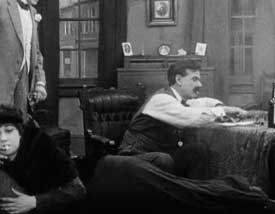 A romantic comedy, The Ambassador's Daughter (1913) opens with the titular character of Helen (Miriam Nesbitt) attempting to give tone-deaf Richard (George Lessey), an attache of the embassy, singing lessons. She soon gives up on a lost cause.
A romantic comedy, The Ambassador's Daughter (1913) opens with the titular character of Helen (Miriam Nesbitt) attempting to give tone-deaf Richard (George Lessey), an attache of the embassy, singing lessons. She soon gives up on a lost cause.
At the Embassy ball, Helen gets attention from two fellas, but her interests lie only with Richard, even though she feels she's still too young & free to want to get married.
Meanwhile there's a plot against the nation undertaken by two spies (Charles Ogle & Mary Fuller) who by their seedier costumes & attitudes end up being the more appealing characters physically, the hero & heroine being namby pamby. But there's no doubt they're villains. Mary Fuller in particular turns in a sexily sleezy performance.
They conspire with a man inside the Embassy, a clerk (Marc McDermot), who everyone should've known was a bad guy becuase he had a tiny villain-mustache. He steals an important government document.
Richard, having been acting odd because of his love for the heroine, falls under suspicion. But the ambassador's daughter trusts Richard completely & is alone in suspecting Dumont the clerk. She sets out to do a little counter-espionage that will inevitably cause her peril.
The ambassador (Robert Brower) soon knows that Richard's being odd because he has pocketed one of Helen's gloves to sniff & fondle at his liesure, which makes him okay in the ambassador's book. Meanwhile, Helen follows Dumont to a low cafe & lurks outside a window, witness to his providing the document to the foreign spies.
She manages to snatch the document & flee with it. The spies are soon after her, but Richard arrives to save the day almost before there's time for suspense to build. Evil Durmont has returned to the Embassy knowing nothing of his conspirators' capture, & will very soon have fallen along with his foiled plan.
The film's a piece of crap as stories go. But in the end when Helen reveals that she knows Richard has been sniffing her gloves, that's kind of funny.
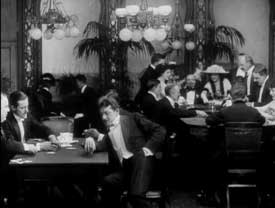 A dying Duke (Wadsworth Harris) worries about his legacy in the hands of a gambling wastrel of a son (Marc MacDermott). He has run up a debt with a loan shark (Harry Eytinge) & any money that passes through his hands is lost on the gaming tables.
A dying Duke (Wadsworth Harris) worries about his legacy in the hands of a gambling wastrel of a son (Marc MacDermott). He has run up a debt with a loan shark (Harry Eytinge) & any money that passes through his hands is lost on the gaming tables.
He is obviously just the sort of fellow to soil An Unsullied Shield (1912), i.e., the family coat of arms that has represented generations of a family that until now has possessed a spotless generations.
We're shown a lot of the son's lifestyle, which does have its appeal. The decadence of his circle has a certain historical interest in showing what the high life was like before the Roaring Twenties.
To keep from being revealed to his parents for the debts he owes, he is willing even to forge his mother's name to a check. Having fallen so low, he is rummaging around in the portrait room for papers, surrounded by paintings of illustrious ancestors.
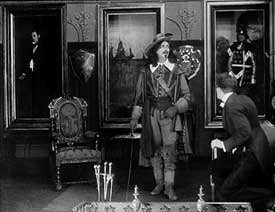 Here the tale turns to fantasy, though given the excuse of a dream. A portrait of a great war hero (Walter Edwin) comes alive & steps down from the frame, to harrangue the wastrel son for sullying the name this warrior fought to defend. Here the tale turns to fantasy, though given the excuse of a dream. A portrait of a great war hero (Walter Edwin) comes alive & steps down from the frame, to harrangue the wastrel son for sullying the name this warrior fought to defend.
The warrior conjures a vision upon the wall, of battles fought & lives lost & revelries of victory. And then the warrior returns to the frame & the next painting of a costumed figure comes alive, that of the Admiral (Herbert Prior), who defended the family crest (or shield) & "left no blot on it." He too conjures an image of a sea battle, cutlasses flashing in the sun upon the deck.
The admiral kisses his sword & returns to the frame. The third of the three paintings is of a more recent ancestor, a great statesman (Augustus Phillips), who likewise preserved the family name untarnished. He conjures a scene of governmental speechifying that changed the nation's history, then he too returns to his frame.
The son is roused in his chair by his mother the duchess (Margery Bonney Erskine), awakened in more ways than one, the ancestral chastisements fresh in his memory. He confesses to his mother the forgery he nearly passed to a loan shark.
From a mother's love, she makes him an honest check, a symbol also of her trust that his intent to be a good son hereinafter is sincere. He bows to his mother, kisses her hands, & is thereafter a proper guardian for the family's wholesome crest.
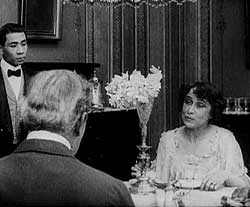 Our third quarter-hour silent film under consideration is a comedy, One Touch of Nature (1914). Mr. & Mrs. bradley (John Sturgeon & Elizabeth Miller) have a Japanese butler, played by T. Tamamoto who might qualify as one of the earliest Asian film actors with a significant acting role.
Our third quarter-hour silent film under consideration is a comedy, One Touch of Nature (1914). Mr. & Mrs. bradley (John Sturgeon & Elizabeth Miller) have a Japanese butler, played by T. Tamamoto who might qualify as one of the earliest Asian film actors with a significant acting role.
As the butler he hovers around the breakfast table attentively & expressively tending to his employers' needs & whims, evading Mr. Bradley's short temper. Tamamoto's scene is fleeting, but he plays it with unusual realism.
Bradley is abusive to all the servants. But his evil temper gets him in trouble when he is bashing his cane pointlessly at the weeds & upsets a hornets' nest that sends him fleeing through the woods.
He's soon lost, but encounters a child fishing, & asks him for directions. As the crabby man looks at the stream, the waterfall, the charming boy successfully catching a fish, feelings of wellbeing wash over him, & for the first time in years he experiences joy.
With his pocket knife he makes himself a fishing pole. "If I only had smokes!" he says, he'd be in paradise. The little boy rushes off for a bit & returns with dried grape stems to use as cheroots, & Bradley quite enjoys that.
When he begins taking off some of his clothes to go wading, plays mumbly peg with the boy, then gets totally naked in the swimming hole, he's actually beginning to look like a potential perv, but I guess kids were safer around evil-tempered men in the fantasy world of movies, as Bradley is pure goodwill around the boy.
They build a campfire & cook the fish they caught, plus they have some wild berries. it's just one happy moment after another. For once Bradley has nothing to complain about. He decides to stay in the woods a day or two & sends the boy off to his house with a note to his wife so no one will worry.
The Japanese butler leads to the lad to Mrs. Butler's parlor, where he recounts the day's adventures with Mr. Bradley. She's almost tearful over it, as it apparently is a rare thing that her husband is ever pleasant about anything.
She has the boy lead her into the woods so she can bring her husband a blanket to spend the night warm & comfy, & ends up spending the night with him sleeping on the ground.
At dawn he awakes to find her with him & for the first time in years reconnects with his affection for her. It ends before we get to see him no longer being abusive to the servants. Not that i'm convinced.
copyright © by Paghat the Ratgirl
|
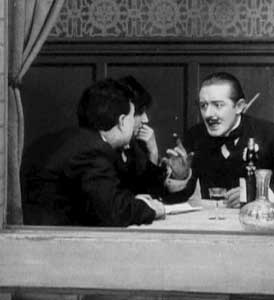


 Here the tale turns to fantasy, though given the excuse of a dream. A portrait of a great war hero (Walter Edwin) comes alive & steps down from the frame, to harrangue the wastrel son for sullying the name this warrior fought to defend.
Here the tale turns to fantasy, though given the excuse of a dream. A portrait of a great war hero (Walter Edwin) comes alive & steps down from the frame, to harrangue the wastrel son for sullying the name this warrior fought to defend.